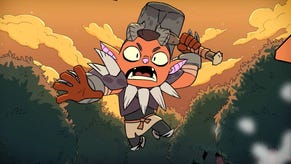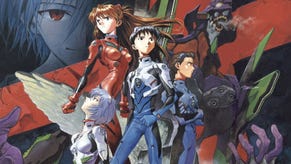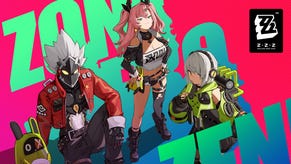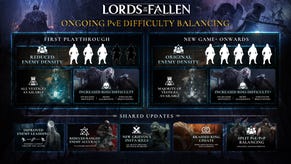DmC - the final interview: staking the heart of perception
DmC: Devil May Cry launches worldwide on January 15th. VG247's Dave Cook speaks with Capcom and Ninja Theory about their partnership, and the perceptions they hope to put to bed once the game drops.
It's funny to think that in just a few days time, almost two years of presumption surrounding Ninja Theory's Devil May Cry reboot will either be confirmed or killed dead. It's something that both the developer and Capcom have been looking forward to for some time, as it means gamers can finally get the title into their hands and judge it on merit, rather than previews, the demo or studio chatter.
I spoke with Capcom US producer Alex Jones and Ninja Theory's communications manager Dominic Matthews at Eurogamer Expo back in September, but I decided to hold off the interview until this week, when both expectations and concerns are running at their hottest. It's a tense time for fans, as I'm sure it is for the game's co-developers, but one thing is certain: seeing the reviews spill out next week will be very interesting indeed.
I asked Jones about the nature of perception surrounding the title, as it's clear that many people made their minds up about the game early on in development. He replied, "There's a lingering uncertainty as to whether we're going to make an awesome Devil May Cry game that wasn't developed directly in Japan. We obviously want to put a stake in the heart of that.
"I'm going to go ahead and say I think we have at this point, so hopefully what we're doing is showcasing what we think is compelling about the title, rather than playing defence, that we can show you and say, 'look, this is great.'"
Jones is referring to - of course - the live demo pods present at Eurogamer Expo, which gave the public an early taste of Ninja Theory's vertical slice, which is available on PSN and Xbox Live now. Both Capcom and the developer have been eager to get DmC into the hands of gamers. But critics have exerted caution around their 'wait and see' messages.
Even on this site I've seen many gamers raise concerns around Ninja Theory's messages - 'Wait until you see gameplay', 'Now wait until the demo comes out', then finally, 'Wait until the full game launches'. I get where they're coming from, but having started a second playthrough recently ago I can see why the studio has been towing this line.
It's because the demo is a tiny fragment, an incomplete shard of a larger package - remember how poor the Bayonetta demo was in comparison to the full game?. You have only a selection of the weapons at hand, the full extent of the clever plot isn't there, and none of the game's stellar moments are present. Maybe Ninja Theory should have revealed more in its demo, but it doesn't matter now as the full game is coming out imminently.
I asked Jones about how seriously Capcom and Ninja Theory takes critical feedback and how it uses it to improve the game. He explained that while it can be tricky, it's something both parties felt was vital to creating the best game they could.
"It's never easy," Jones explained, "because inevitably you have to have a more or less done game. When you have a more or less done game, people just want it to be done, they don't want to go back and open it up to make changes.
"But we have to, because if you're not iterating, not polishing a game like this... it's all about the polish, you actually do need to work almost to the point of diminishing returns, because the previous games have just been so highly-polished when it comes to the combat and fluidity. So basically, these guys have been good sports about really polishing up to the last possible moment."
At the end of the day, it's Ninja Theory who has to open the game back up and fix issues. Where some might view this as a laborious chore, Jones explained that the developer was committed to the cause, "These guys have been amazing, like most developers would had three or four random guys from Japan show up at some point and start lecturing them about how to do stuff, and it might not have gone as well.
"But the Japanese guys are super-open about knowing what Ninja Theory did well and leaving them alone to do that, and the Ninja Theory guys were really good about knowing that there is almost 30 years of fighting game experience at this table and thinking, 'We should probably listen to them.'
"There are very few good independent developers, and if you get the chance to lock one or two down and continue to work with them, as a publisher you have to do that. Because firstly you'll never have enough internal capacity – given the expense involved in making games – to keep your portfolio level where it needs to be.
"Guys like Ninja Theory and Dontnod who – in the case of Ninja Theory have a proven track record of delivering quality products more or less on time, and at an expected level of quality – I mean yeah, you have to keep working with those guys."
Jones closed by saying very frankly, "We looked at it like, 'We need to make the best DmC game we can make, or we're not going to get another shot'". He's right of course, because if this game fails in the current climate it will be tough to convince Capcom - or any publisher when facing any new title - to spend money and resources on anything less than a sure thing.
I then turned to Matthews and asked him how it feels to be bombarded with daily negativity and questioning from fans. He replied, "We've even seen people questioning if Ninja Theory even like Devil May Cry, and I can tell you that we're in love with it. Through the job it becomes your life."
It's clear that the Devil May Cry franchise is a big favourite around the Ninja Theory office, so I asked Matthews if the studio felt privileged when it landed the reboot gig. "Of course yeah," he replied, "and that goes across the studio. One thing that's very strong at Ninja Theory is that we want to work on projects that we want to work on, and Devil May Cry was one of those.
"We jumped at the chance to work on this and it was great to work with Capcom, but from day one it was really a collaboration between the talent at the studio and at Capcom. Although we didn't have the same level of freedom that we would have with our own IP, it was a new, exciting and experimental period to take an existing franchise and character, and then come up with a new, interesting direction.
"That was really something we worked closely with Capcom on. It wasn't a case of us just going off and doing our own thing, then just throwing it out there. We worked iteratively with Capcom over time to get it down to exactly the right direction.
"There's a lot of talent on both sides, and I think like Alex said; Capcom has got such a rich heritage in fighting games – probably better than anyone else in the world – so it's humbling for us to work with these people who know these things so well.
"But what we bring to the table is a different set of skills – story-telling, visuals, action gameplay that we've shown in out previous games – and there is huge mutual respect. The partnership between Capcom and Ninja Theory is very strong, and actually we're quite similar in many ways because we have such high standards on both sides that we both know we're pulling in the right direction."
Although expectations were high, Capcom was happy to let Ninja Theory run riot on the areas it excelled at, "I think Capcom gave us a good level of freedom and actually pushed us to think about Devil May Cry in different ways," Matthews continued, "so there's elements of the game that are entirely consistent with the canon, and there are others that we have changed. As a partnership we felt they were the right things to do.
"I would say that the game has a fresh new look and feel, but there are certainly things in there that fans will recognise. Dante is the Dante that everyone knows and loves, and you will see that develop over the course of the game. Then you have characters like Vergil. We know who Vergil is and we wanted to show a different part of that story."
No matter who you ask, the meat of DmC comes down to its combat, and Matthews was happy to explain what Ninja Theory was trying to achieve with Dante's new tool-set, "We've got amazing designers who have worked on this for three years," he explained, "but we've also had amazing partners at Capcom with Itsuno-san, who was director on previous Devil May Cry games and who held our hands at the start, and helped us get this exactly right.
"What we wanted to do was create a tool-set of combat options that you could pick and choose from as you want to express themselves through the system, and yeah, it's taken a lot of sweat and blood to get it just right, but the pay-off – we've seen people playing it and telling us it feels and plays better than they expected.
"To be given this opportunity to work on the title, and with Capcom themselves, but to also see the inner workings of Capcom's thinking towards combat – like I said – they're the best in the world I think. Seeing where they're coming from in regards to games in the past has been amazing, but we're now at a place where we feel we've nailed combat to an extent."
I close our chat by asking Matthews what he felt when seeing people playing Devil May Cry at Eurogamer Expo and gauging their initial reaction, "I think it was more than looking to individual moments. Something we wanted to do was get that feeling of experimentation and discovery in the combat.
"I've been playing this game for a long time now and I'll come to shows like Eurogamer Expo and I'll see someone doing something completely different stuff to me, or that no-one at the studio has seen. That's where the real fun comes, and we've had some hardcore guys come into the studio and give us some feedback.
"It's been amazing to talk with them and hear them say, 'I wonder if I can do this?' then they go away and find that yeah, they can do that. This is a feeling that Devil May Cry had, and one that we wanted to bring in DmC. I'm excited to see this game come out and to see player videos, because I just know there's going to be stuff we haven't seen before or haven't even thought about.
"We wanted people to be limited only by their imagination. We've got so many options, and the ability to change combos on the fly mid-combo, you can start a combo with one weapon and end it with another, you can add in Dante's abilities, you can switch combos in the air, use firearms.
"It comes down to a question of how dexterous you are with the pad, but it's something that I personally enjoy – playing the game for twenty minutes to try more and more stuff."
Jones then added, "I want people to come away and say 'that was an awesome game', whatever that may mean. Because for some people it will be their first Devil May Cry experience, but for others it will be a series they've played for a long time.
"But more than just saying it's awesome, I want them to say that then start the game again, and again, and again to push those ranks up, learn new combos and unlock new things."
Devil May Cry launches on PS3 and Xbox 360 worldwide on January 15th. You can read our final impressiosns on January 14th at 8am.







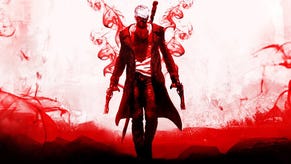
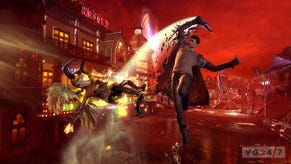
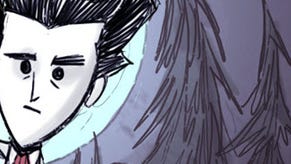
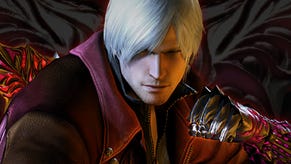
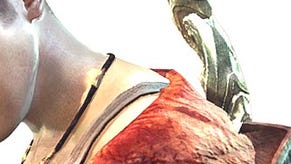
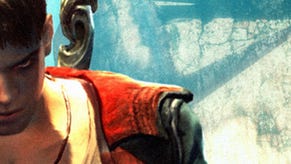
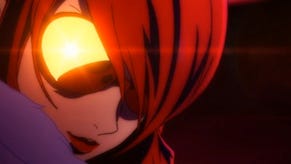
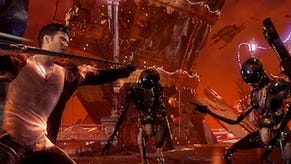
.png?width=291&height=164&fit=crop&quality=80&format=jpg&auto=webp)
